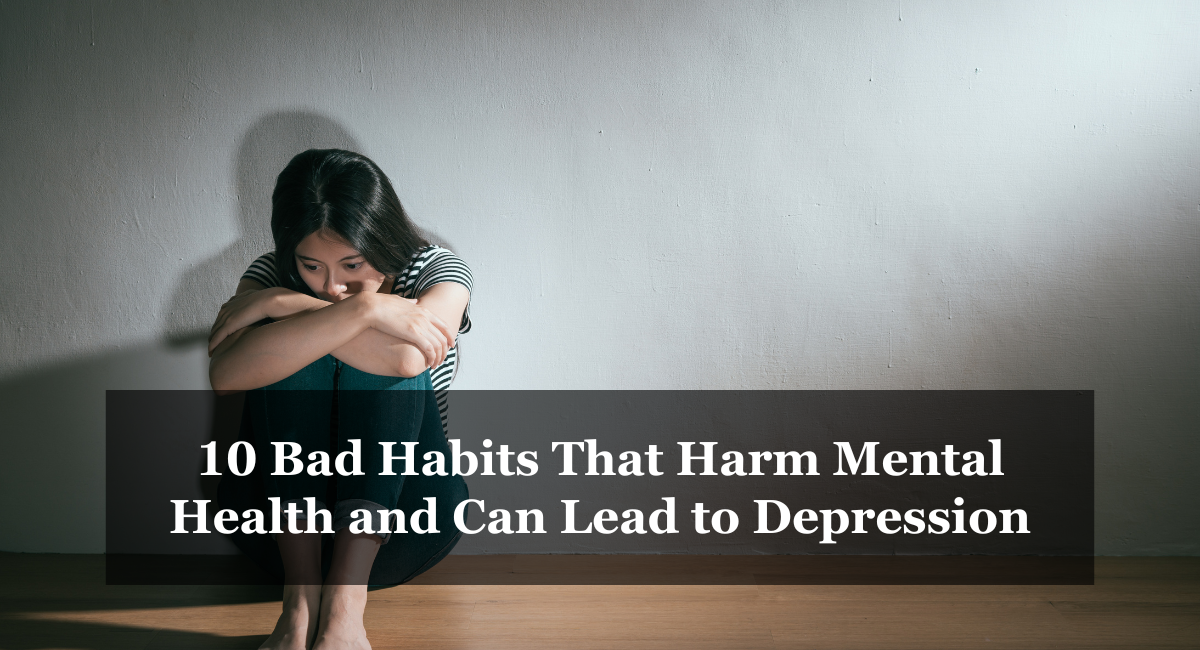Understanding the intricate connection between daily habits and mental health is crucial. Often, small changes in routine and mindset can have profound impacts on overall well-being.
This blog post explores and expands upon 10 habits that could be detrimental to mental health and potentially lead to depression.
1. Neglecting Self-Care
Deeper Insight: Self-care is more than just a buzzword; it’s a necessary practice for mental and physical health. It encompasses adequate sleep, a balanced diet, regular exercise, and personal hygiene.
Signs of Neglect: Feeling constantly tired, poor eating habits, and disregard for personal cleanliness.
Strategies for Improvement: Establish a routine that includes set times for sleep, meals, and personal care. Engage in activities that relax and rejuvenate you.
2. Overuse of Social Media
Deeper Insight: While social media keeps us connected, its overuse can lead to an unhealthy comparison with others, impacting self-esteem and happiness.
Signs of Overuse: Spending hours scrolling through feeds, feeling unhappy after using social media, and preferring virtual interaction over real-life contact.
Strategies for Improvement: Limit your daily social media usage, engage in digital detoxes, and focus on real-life connections and activities.
3. Avoiding Social Interaction
Deeper Insight: Humans are social beings. Avoiding interaction can lead to feelings of isolation, a significant factor in depression.
Signs of Avoidance: Turning down invitations, feeling anxious about social gatherings, and preferring to be alone consistently.
Strategies for Improvement: Start with small gatherings, engage in activities you enjoy with others, and gradually increase your social interactions.
4. Pessimism and Negative Thinking
Deeper Insight: A pessimistic outlook can trap you in a cycle of negativity, influencing how you perceive life events.
Signs of Pessimism: Always expecting the worst, focusing on negatives in every situation, and having a bleak outlook on the future.
Strategies for Improvement: Practice gratitude, challenge negative thoughts, and try to find a positive angle in difficult situations.
5. Poor Stress Management
Deeper Insight: Inability to manage stress can lead to chronic anxiety and depression.
Signs of Poor Management: Feeling overwhelmed regularly, physical symptoms like headaches, and inability to relax.
Strategies for Improvement: Adopt stress-relief practices such as mindfulness, yoga, or deep breathing exercises.
6. Substance Abuse
Deeper Insight: Using substances as a coping mechanism can quickly turn into dependency, exacerbating mental health issues.
Signs of Abuse: Relying on substances to get through the day, neglecting responsibilities, and experiencing withdrawal symptoms.
Strategies for Improvement: Seek professional help, find healthy coping mechanisms, and build a support system.
7. Overworking
Deeper Insight: The culture of overworking can lead to burnout, a state of emotional, physical, and mental exhaustion.
Signs of Overworking: Constantly working late hours, feeling stressed about work even during off hours, and neglecting personal life.
Strategies for Improvement: Set boundaries for work hours, take regular breaks, and ensure time for leisure activities.
8. Lack of Physical Activity
Deeper Insight: Exercise has a direct impact on mood and energy levels, and its absence can aggravate depressive symptoms.
Signs of Inactivity: Spending most of the day sitting, feeling lethargic, and a general disinterest in physical activity.
Strategies for Improvement: Incorporate small activities like walking, stretching, or home workouts into your daily routine.
9. Ruminating on Past Mistakes
Deeper Insight: Dwelling on past errors can lead to a cycle of negative thinking, impacting self-esteem and future actions.
Signs of Rumination: Frequent thoughts about past failures, inability to move on, and self-criticism.
Strategies for Improvement: Practice mindfulness, learn from past mistakes instead of dwelling on them, and focus on the present.
10. Ignoring Mental Health
Deeper Insight: Neglecting mental health is akin to ignoring physical health; it can lead to deterioration and severe conditions like depression.
Signs of Ignorance: Disregarding emotional distress, reluctance to seek help, and underestimating the impact of mental health issues.
Strategies for Improvement: Regular mental health check-ins, seeking professional help when needed, and being open about mental health struggles.
Conclusion
Recognizing and modifying these habits can significantly improve mental health. It’s essential to remember that seeking help is a sign of strength, not weakness. Your mental health is a vital component of your overall well-being and deserves attention and care.

